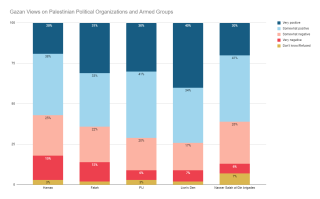All it takes for Evil to triumph is for good people to do nothing
Michael Loymanool all the people all the time.” A. Lincoln
According to the latest Washington Institute polling, conducted in July 2023, Hamas’s decision to break the ceasefire was not a popular move. While the majority of Gazans (65%) did think it likely that there would be “a large military conflict between Israel and Hamas in Gaza” this year, a similar percentage (62%) supported Hamas maintaining a ceasefire with Israel. Moreover, half (50%) agreed with the following proposal: “Hamas should stop calling for Israel’s destruction, and instead accept a permanent two-state solution based on the 1967 borders.” Moreover, across the region, Hamas has lost popularity over time among many Arab publics. This decline in popularity may have been one of the motivating factors behind the group’s decision to attack.
In fact, Gazan frustration with Hamas governance is clear; most Gazans expressed a preference for PA administration and security officials over Hamas—the majority of Gazans (70%) supported a proposal of the PA sending “officials and security officers to Gaza to take over the administration there, with Hamas giving up separate armed units,” including 47% who strongly agreed. Nor is this a new view—this proposal has had majority support in Gaza since first polled by The Washington Institute in 2014.
Nevertheless, there is widespread popular appeal for competing armed Palestinian factions, including those involved in the attack. Overall, 57% of Gazans express at least a somewhat positive opinion of Hamas—along with similar percentages of Palestinians in the West Bank (52%) and East Jerusalem (64%)—though this is fewer than those who support Fatah (64%).
But it is organizations like Palestinian Islamic Jihad (PIJ) and Lion’s Den that receive the most widespread popular support in Gaza. About three quarters of Gazans express support for both groups, including 40% who see the Lion’s Den in a “very positive” light, an attitude shared by a similar percentage of West Bank residents. Moreover, when it comes to Iran, which has strongly supported and potentially helped coordinate the attack, about half of Gazans view Tehran as either a “friend of the country” (29%) or security partner (28%), compared to less than a third of West Bankers who would say the same.
Hamas Unpopular in Key Arab States
In contrast, the reputation of Hamas among a number of Arab states has been on a much more significant decline—slowly in some cases and more rapidly in others. The United Arab Emirates and Saudi Arabia both stand out as countries where support for Hamas has virtually evaporated. When first polled in 2014 (and again in 2017), about half of Emirati citizens (44% and 48%, respectively) expressed positive opinions of Hamas. Yet the percentage of positive responses has dropped in every subsequent year polled. In August 2023, just 17% expressed a positive view. A similar trajectory can be seen in Saudi Arabia, where just 10% expressed a positive view in August—whereas 48% say their opinion is very negative.
In other Arab countries, including Qatar, Bahrain, and Egypt, a more modest ten-point drop in popularity is visible over a shorter period, last polled in late 2020. In this case, Jordan in particular stands out: whereas almost three quarters (72%) expressed a positive attitude toward Hamas in 2014, this percentage had dropped to 44% in November 2020.
Hezbollah and Iran Even More Unpopular in Arab States
As another self-styled defender of the Palestinian cause and “axis of resistance” member, Hezbollah is also deeply unpopular in these Arab countries outside of its core followers in Lebanon. This has become all the more so the case over the past several years. Those who express a positive view of the group are in the single digits in Egypt, Jordan, Kuwait, Qatar, Saudi Arabia, and the UAE as of November 2020. Outside Jordan, at least two thirds in each country say that they have a “very negative opinion” of the group. In Bahrain, positive views are only slightly higher at 17%; and even in Lebanon, approval has been steadily shrinking since 2017—from 50% to 34% when last measured in 2020.
Moreover, polls in most of these countries over the past several years demonstrate that only small minorities in most locales believe that good relations with Iran are even “somewhat important” to their country. In the most recent poll in Saudi Arabia and the UAE, for example, just 19% of Saudi citizens voiced that view; among Emirati citizens, the corresponding figure was 17%. As such, while expressions of support for the Palestinian cause are widespread throughout the Arab world, attitudes toward the terrorist groups attempting to claim it are decidedly unpopular in a number of Arab countries.
But Saudis and Emiratis See Israel as Internally Divided
At the same time, majorities in Saudi Arabia and the UAE view Israel as internally weak and divided, a viewpoint that may have impacted Hamas’s calculations as well. When asked in August, 70% of Saudis and 72% of Emiratis agreed at least “somewhat” that “the mass protests by Israelis against the Netanyahu government show that Israel really is a weak and deeply divided country that can be defeated someday.” By comparison, about 17% in either country support the proposition that the protests show Israel as “a strong and resilient country, where different opinions are respected.” Nevertheless, the same Saudi survey revealed that around a third of citizens there wanted business ties with Israel, even without a formal agreement on normalizing ties.
Methodology
This analysis is based on findings from surveys commissioned by The Washington Institute and conducted by Palestinian Center for Public Opinion (PCPO) and a highly qualified, experienced, and independent regional commercial survey firm. The survey comprised face-to-face interviews with representative national samples of 1,000 citizens in Arab countries polled and at least 500 residents each in the West Bank, Gaza, and East Jerusalem, selected according to standard geographic probability procedures. The contractors provided strict quality controls and assurances of confidentiality throughout the fieldwork, coding, and data processing. Additional methodological details, including full questionnaire, marginal results, and demographic breaks, are readily available upon request, and can be directed to submissions@fikraforum.org.
All it takes for Evil to triumph is for good people to do nothing
https://www.washingtoninstitute.org/policy-analysis/polls-show-majority-gazans-were-against-breaking-ceasefire-hamas-and-hezbollah
Michael Loyman


